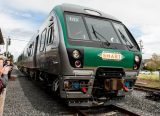Blog Post < Previous | Next >

SMART
SMART Pricetag to Exceed $1 billion; Additional $622m Requested
On October 21st SMART shared a new document outlining an additional $622m in funding requests. These outline the newly anticipated additional funding required to complete the SMART train project:
SMART RTP2017 AttachmentA_Detail
These asks can be broken down as follows:
- $178m - Extend from Santa Rosa to Cloverdale.
This was promised to be delivered to voters within the original Measure Q funding request. - $42.53m - Extend from San Rafael to Larkspur
Again this was promised within the original Measure Q. - $53m - Add additional 'C' cars (third middle carriages)
SMART's ridership numbers do not merit this additional expense as covered in this Marin Voice piece that I co-authored with Mike Arnold. - $40m - Rail freight improvements
Why are taxpayers being asked to foot the bill to help commercial freight operations? If there's a return on investment for taxpayers we've yet to see this articulated. - $29m - Rail operations capacity enhancements - handling freight, Positive Train Control (safety system) maintenance.
Positive Train Control is a foreseeable requirement - this should have been in Measure Q. - $11m - Petaluma, add a second station and "associated amenities"
Before adding stations it would be better for SMART to understand if it will generate sufficient ridership to justify adding stations. This station by itself will hardly tip the balance. - $124m - Construct the SMART bike path
This was originally promised to be delivered by Measure Q; costs were projected to be $91m in 2009 - $120m - Add facilities to stations
...including station furniture, ADA features, landscaping, bike and car parking and sharing, real time transit signage, "intermodal improvements", security enhancements and programs for car sharing - $24m to cover operational costs for local partnerships with bus operators
...these are the shuttles that were again promised to be provided by Measure Q
What this means is that the price tag of SMART, as promised to voters in Measure Q, is going to more than double from $429m - the most recently stated SMART cost figure to $1 billion.
(Note: This figure of $1 billion excludes bond interest - so some may argue that the true cost of the project to taxpayers may be nearer $2 billion).
Additional Useful Insight
Documents from November 2010 SMART Board Workshop show that SMART set aside $213m from the Measure Q 1/4c sales tax bond issue for construction (some sales tax revenue was set aside to cover annual operating costs). SMART elected to convert a large portion of the annual sales tax revenues into bonds so that they would have the cash up front to construct the line. Of course this figure never came anywhere close to even the $427m let alone the now apparent billion dollar plus price tag. SMART was always going to need 1/2c sales tax.
The Promise to Cyclists is Broken
Measure Q only just passed with 69.6% of the vote in November 2008. The measure included this specific wording:
"a bicycle/pedestrian pathway linking the stations"
Through adding this wording the train gained the not insubstantial support of the bike community. But now SMART is saying that the 1/4c ($213m) was not used towards the bike path, and a further $124m will need to be raised. The question that arises is SMART potentially never had the sincere intent to deliver the promised bike path. If it had told the truth would the measure had passed? After failing to pass a fourth time would it have even been put to the vote again?
The Big Question - How Are Operations Going to Be Funded?
In the November 2010 SMART Board Workshop document SMART estimates that annual operating costs for the full line will be to the order of $26.8m. On top of this will be debt servicing costs for the bond. The way the bond was financed interest payments will not be fixed but will rise every year.
If one looks like a near comparable line, the Seattle Sounder - which actually goes to downtown Seattle and a major airport - SeaTac and serves a population catchment double that of SMART - achieves a farebox recovery of just 24.1% (see page 8 of Sound Transit's 2014 Fare Revenue Report). This farebox recovery figure means the Sounder's ticket revenues only cover 24.1% of annual operating costs. SMART, serving a far smaller population catchment - about half that of the Seattle Sounder - is unlikely to come anywhere close to this farebox recovery. In other words it will operate at a considerable loss, which it is legally obligated to fund, it cannot run at a loss.
What is becoming increasingly evident is that the public is bankrolling a system that has not presented how it can financially sustain itself. In other words the $r427m, or if fully funded, $1 billion could be completely wasted if SMART runs out of money. Worse SMART could start to cannibalize other genuinely cost effective services.
The questions that need to be asked are - where is the financial oversight? Why are we continuing to throw money at a project that has yet to demonstrate financial responsibility or ability to sustain itself. Essentially SMART is making a very bad gamble with over a billion dollars of taxpayers money. The question is - what does it take to end this?


